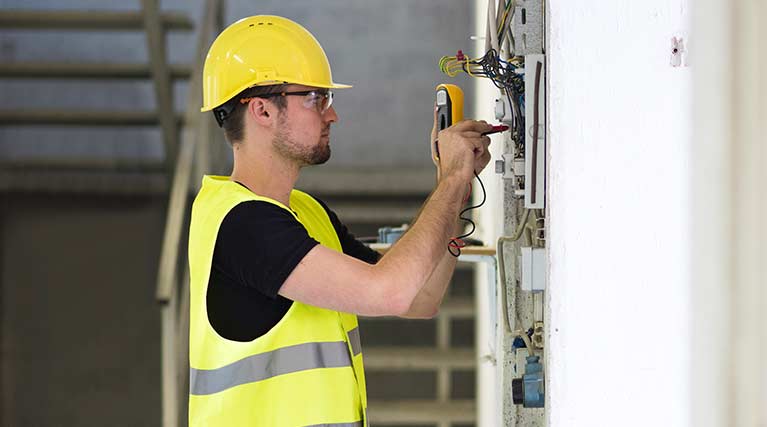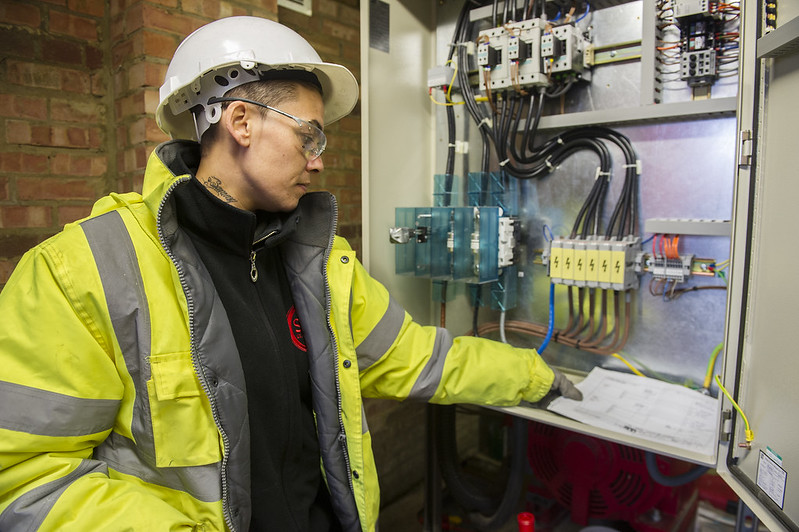Understanding how to become an electrician involves earning GCSEs in maths, English, and science, then completing an apprenticeship and gaining technical qualifications. Afterward, pass the AM2 assessment and register with a Competent Person Scheme to work independently.
What Are the Main Types of Electricians?
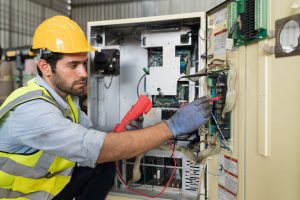
An electrical installation technician, or electrician, is a person who installs, maintains, and repairs electrical systems in various buildings. Depending on their area of specialisation, the role of electricians can vary significantly.
There are three main areas of electricians:
- Installation Electricians: Their main responsibility is to install and maintain electrical systems in buildings. This includes testing a range of equipment, such as power outlets, fire alarms, and lighting systems, to identify faults. When problems are found, they must be fixed promptly.
- Maintenance Electricians: These electricians are responsible for general electrical maintenance. This involves repairing and setting up wiring systems, replacing fuses, switches, and lamps, and carrying out tests on wiring systems.
- Domestic Electricians: Domestic electricians specialise in residential homes. They install, repair, and maintain electrical systems in domestic properties, including wiring, lighting, and sockets, and ensure that the home meets electrical safety regulations.
- Commercial Electricians: These electricians work in business environments such as offices, shops, and warehouses. They handle the installation and maintenance of electrical systems that power commercial premises, which may include wiring office buildings, installing security systems, or ensuring that emergency lighting functions correctly.
- Industrial Electricians: Industrial electricians work in factories, manufacturing plants, or other industrial sites, managing heavy machinery, control systems, and power distribution. They handle large-scale electrical installations, ensuring that equipment is powered and maintained safely.
- Maintenance Electricians: These electricians install and maintain electrical systems in buildings and structures like homes and offices, inspect and repair electrical power-generating, controlling, and transmitting equipment, and ensure the safe and efficient functioning of electrical systems.
- Installation Electricians: Installation electricians focus on installing new electrical power systems. They might work on new properties or renovate existing ones, ensuring that all wiring and lighting are in place and safely installed.
- Highway Systems Electricians: This role involves installing, maintaining, and repairing outdoor electrical systems, such as street lighting, traffic lights, and motorway systems. The job requires passing a series of tests and maintaining a relevant licence.
- Solar Electricians: With the rise of renewable energy, solar electricians install and maintain solar panel systems. They ensure that homes and businesses can efficiently use solar energy and connect these systems to the electrical grid.
- Marine Electricians: Marine electricians install, maintain, and repair electrical systems on ships and boats, including navigation systems, electrical power generation, lighting, and other on-board systems.
- Substation Electricians: These electricians maintain and repair electrical substations – the large facilities that distribute energy to homes and businesses. They work with high-voltage systems that transmit power from dams, power plants, and other generation sites to customers.
In conclusion, while the role of each type of electrician can differ, their main aim is to install, maintain, and repair electrical systems across various settings.
What Does an Electrician Do?
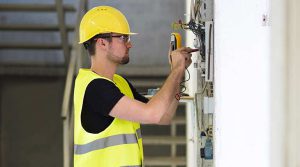
Electricians are responsible for installing, maintaining, and repairing electrical systems to ensure they work safely and effectively. Their duties vary by specialisation, but the following are the general responsibilities of an electrician:
- Installing Electrical Systems: Electrical installers set up wiring, lighting fixtures, electrical panels, and other devices that provide electricity to homes, businesses, or industrial buildings. They typically install these components according to blueprints, diagrams, or other documentation that shows the layout and design of the electrical system, as well as codes and regulations from local authorities on electrical work.
- Maintenance of Electrical Systems: Electricians are responsible for maintaining electrical systems to ensure they operate efficiently and safely. Maintenance tasks include: Inspecting electrical wiring and components, Performing tests, and Replacing worn-out or defective parts.
- Diagnosing and Repairing Electrical Faults: Electricians diagnose and repair faults in electrical systems. They repair faulty wiring, replace broken components, or mend faulty electrical circuits.
- Safety: Electrical installations and repairs must be conducted safely, in accordance with the regulations of the Institute of Engineering and Technology (IET) and its UK Wiring Regulations (BS 7671) 2018, British Standards, the Health and Safety Executive (HSE), and other recognised authorities.
- Testing Electrical Systems: After an electrical installation or repair, but before the system is commissioned and put into use, electricians test it to ensure it is working correctly. They use specialised tools, such as multimeters and insulation resistance testers, to verify that electrical circuits are safe and functioning.
- Reading Blueprints and Technical Diagrams: Electricians often work from blueprints or technical diagrams that depict the layout of electrical systems. Being able to interpret these plans is crucial for the proper installation of electrical components.
- Upgrading Old or Inefficient Electrical Systems: Many jobs involve upgrading old or inefficient electrical systems, such as fitting energy-efficient lighting, replacing circuit breakers, and adding outlets to meet the needs of modern appliances.
- Working with Clients: Electrical technicians work closely with clients, whether homeowners or business owners. They must explain what is being done, provide estimates, and ensure that the work meets the client’s satisfaction.
Average Salary Range of an Electrician
Several factors affect the salary of an electrician in the UK, including their level of experience, qualifications, and the type of work they do. This information explains what an electrician can expect to earn in the country:
- Apprentice Electrician: Apprentices can expect to earn between £12,000 and £20,000 per year while they train to become fully qualified electricians. An apprentice electrician works alongside a fully qualified electrician while studying either in college or through technical courses.
- Qualified Electrician: Once qualified, electricians typically earn between £28,000 and £35,000, depending on the type of work (domestic, commercial, industrial) and their location (electricians in London and other cities generally receive higher salaries).
- Experienced Electrician: Electricians with several years of experience or those who specialise (e.g., in industrial or substation work) can earn between £35,000 and £45,000. Some electricians who run their own businesses or work as contractors may earn more, depending on the demand for their services.
- Self-Employed Electrician: Some electricians choose to work as self-employed contractors, which gives them the freedom to set their own rates and schedules. Self-employed electricians can earn between £35,000 and £60,000 per year. Those with a large client base and complex jobs may earn more.
- Senior Electricians and Supervisors: Electricians who move into supervisory or managerial roles, such as site supervisors or electrical foremen, can expect to earn £45,000 or more per year. These roles involve overseeing work crews, managing projects, and ensuring that all work meets safety and quality standards.
Essential Skills of an Electrician
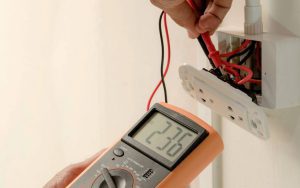
To become a good electrician and succeed in a career as an electrician, one needs to acquire not only technical knowledge but also practical skills and personal qualities. The following are the skills required to become an electrician:
- Technical Knowledge: Electricians need to understand electricity, how it is used, how electrical systems work, wiring regulations, and electrical safety standards. This knowledge typically comes from formal education, training, or instruction.
- Problem-Solving Skills: Strong problem-solving skills are essential for diagnosing and repairing electrical faults. An electrician must be able to identify the problem area, determine the cause, and find an appropriate solution.
- Attention to Detail: Electricians must be very detail-oriented. They need to carefully install wiring, ensure wires are connected properly, and adhere to safety procedures.
- Manual Dexterity: Electricians often work in small and awkward spaces, so good manual dexterity is important. This includes connecting switches and handling small electrical components.
- Physical Stamina: Physical stamina is crucial because electrical work can be physically demanding. Electricians frequently work standing up, climb ladders, or work in confined spaces.
- Communication Skills: Effective communication is necessary for interacting with clients, colleagues, and supervisors. Electricians must explain complex technical concepts to non-experts, provide clear directions to apprentices, and discuss project details with clients.
- Time Management: Electricians often handle multiple projects simultaneously or work to tight deadlines. Good time management skills are important to complete tasks efficiently and keep up with their workload.
- Safety Awareness: Electricity requires a high degree of safety awareness. Electricians must follow safety precautions to prevent accidents such as electrocution. It is crucial to adhere to guidelines and wear the correct protective equipment.
- Customer Service: For electricians working directly with clients, excellent customer service skills are important. Being professional, courteous, and responsive to clients’ needs helps to build trust and provide a positive experience.
Tips For Electrician
Here are some useful tips for hopeful electricians to succeed in their newfound profession:
- Enrol in an Apprenticeship Program: Start with an apprenticeship to gain hands-on experience and training.
- Invest in the Necessary Tools: Acquire high-quality, reliable tools to make your job easier and safer. Ensure they are well-maintained and bring them with you to the job site.
- Safeguard Your Safety: Always adhere to safety regulations and wear the required protective equipment to prevent accidents and injuries.
- Demonstrate Professionalism: Show reliability, punctuality, and dedication in all aspects of your work.
- Engage in Ongoing Education: Promote yourself as a collaborative team member by participating in continuous learning and keeping up to date with the latest UK Wiring Regulations (BS 7671) and health and safety guidelines.
- Foster Constructive Relationships with Your Customers: Build and maintain positive relationships with clients by being transparent about pricing, communicating clearly, and providing excellent service.
- Execute Your Work with Precision and Efficiency: Pay attention to detail and perform tasks accurately to ensure quality workmanship.
- Keep Your Tools in Good Shape: Regularly maintain your tools to ensure they remain in optimal working condition.
- Maintain a Positive Attitude: Be cheerful and professional towards your coworkers and customers to create a pleasant working environment.
- Make Your Presence Known Without Being Disruptive: Be professional and respectful in your interactions without causing unnecessary disruption.
- Get a Good Grounding in Maths and Science: Electrical work involves calculations and physics, so a solid foundation in maths and science from school will be beneficial.
- Gain Early Experience: Acquire hands-on experience through an apprenticeship, work experience, or part-time jobs to understand how electrical systems work.
- Stay Updated: Keep up with the latest developments in electrical regulations and safety guidelines by attending refresher courses and seminars.
- Cultivate a Strong Work Ethic: Be prepared for long hours and challenging jobs. Your reliability, punctuality, and dedication will be recognised and rewarded.
- Join a Union: Consider union membership for access to training programmes, better pay, benefits, and networking opportunities within the industry.
- Network with Other Electricians and Contractors: Join professional associations, take up apprenticeships, or attend trade shows to make valuable industry contacts.
- Consider Niche Specialisation: Becoming an expert in a particular area, such as renewable energy systems or home automation, can make you more valuable to employers or clients.
- Create Loyal Customer Relationships: If self-employed, focus on building your brand and reputation. Treat customers well, be transparent, and provide top-notch service to earn more referrals.
Requirements For Electrician

In the UK, being an electrician requires not only education and training but also time to practice and learn how to perform the job effectively. The path to becoming an electrician and obtaining the necessary qualifications for electrician is as follows:
- GCSEs or Equivalent: Good grades in maths, English, and science are essential for starting your career in electrician jobs. These subjects provide the foundational knowledge needed for understanding electrical concepts and calculations.
- Complete an Apprenticeship: An apprenticeship is one of the most popular routes to becoming an electrician. It typically lasts between three and four years and includes both classroom-based learning and practical experience. During your apprenticeship, you will be guided by experienced electricians while working towards a qualification such as an NVQ Level 3 in Electrotechnical Services.
- Obtain the Right Qualifications: In addition to completing an apprenticeship, you’ll need to acquire technical qualifications. For example, the City & Guilds Level 2 and Level 3 Diplomas in Electrical Installations cover essential topics, including electrical theory, wiring regulations, and health and safety.
- Gain Experience: To become a skilled electrical contractor, practical experience is crucial. This involves working alongside an electrician—whether through an apprenticeship or as an assistant—to learn how to wire a house, locate and fix electrical faults, and use electrical tools effectively.
- Part P Qualification (Domestic Electricians): If you plan to work as a domestic electrician, you will need to be qualified under Part P of the Building Regulations. This qualification allows you to carry out electrical work on residential properties, ensuring that your work meets safety standards.
- Pass the AM2 Assessment: Once you have acquired the necessary skills, you must pass the Achievement Measurement 2 (AM2) assessment to qualify as a fully-fledged electrician. This practical test assesses your ability to install, inspect, and test electrical systems to industry standards.
- Register with an Approved Competent Person Scheme: After qualifying, you should register with an approved Competent Person Scheme, such as NICEIC or NAPIT. Being registered allows you to self-certify your work, meaning you can install or repair electrical systems without needing to notify local building control.
- Update Your Training: As an electrician, it is your responsibility to stay informed about new regulations and updates in your profession. Continue your professional development to ensure a safe and legally compliant work environment. Keeping up-to-date with regulations and additional training is essential.
How to Become an Electrician
To become an electrician in the UK, one must undergo several steps. Below is a breakdown of the required education, training, and experience to become an electrician. Here is a step-by-step guide:
- Get in the Right Starting Position: Begin with good GCSEs in maths, English, and science. These subjects provide the fundamental building blocks for understanding electrical theory and its applications.
- Apply for an Apprenticeship: The most common path to becoming an electrician is through an apprenticeship. Apprenticeships combine classroom training with on-the-job experience. Apply for an apprenticeship with an electrical contractor or training provider to gain practical experience.
- Obtain Full Technical Qualifications: Throughout your apprenticeship, you will work towards technical qualifications such as the NVQ Level 3 in Electrotechnical Services and the City & Guilds Level 2 and 3 Diplomas in Electrical Installations. These qualifications demonstrate the theoretical and practical knowledge required for a career in electrical work.
- Learn On the Job: During your apprenticeship, you will gain hands-on experience working on live electrical installations under the supervision of an experienced electrician. This practical training is essential for developing your skills.
- Pass the AM2 Assessment: At the end of your apprenticeship, you will need to pass the AM2 assessment, a practical test that evaluates your ability to install, inspect, and test electrical systems to industry standards. This is the final step to becoming a fully qualified electrician.
- Obtain a Part P Qualification (for Domestic Electricians): If you plan to work on domestic properties, you will need to achieve a qualification under Part P of the Building Regulations. This ensures that your work complies with safety regulations for residential electrical installations.
- Register as a Competent Person: After obtaining your qualifications, you can register with a Competent Person Scheme, such as NICEIC or NAPIT. This registration allows you to self-certify your work, meaning you can carry out installations and repairs without needing approval from local building control.
- Consider Specialisation: As a qualified electrician, you might consider specialising in areas such as renewable energy systems, industrial installations, or home automation. Specialising can help you become a leader in your field and potentially increase your earning potential.
- Engage in CPD (Continuing Professional Development): Electrical standards and technology are constantly evolving. To keep your skills up to date, participate in CPD activities, such as workshops, training sessions, and refresher courses, to stay current with industry developments.
Get Qualified as an Electrician
Essential Electrician Training, Fundamental Skills for Electricians, Electrician Mastery Skills, Mastering the Essentials for Electricians
Frequently Asked Questions
Why Should You Be an Electrician?
Being an electrician is a rewarding job. It offers stability, opportunities for specialisation, and allows you to work in a practical, hands-on environment. Electricians are always in demand, and the skills you acquire can lead to a well-paying career.
Is Being an Electrician a Good Career Choice for You?
If you enjoy working with your hands, solving problems, and thriving in a dynamic environment, then a career as an electrician could be an excellent choice for you. The role offers a varied career path, from domestic to industrial installations, with the potential for a good salary.
How much does an Electrician Earn?
In the UK, the average salary for an electrician varies depending on experience and field of specialisation. An entry-level electrician can earn between £18,000 and £25,000 per year, while an experienced electrician can earn between £35,000 and £45,000 per year. Electricians who work independently may earn more, depending on the availability of jobs.
Which Qualifications Can Help with a Career as an Electrician?
To train as an electrician, you will need to complete a 4-year apprenticeship and obtain the associated technical qualifications, such as the NVQ Level 3 in Electrotechnical Services or the City & Guilds Level 2 and 3 Diplomas in Electrical Installations. Additional qualifications, such as Part P certification, will be beneficial if you plan to work in domestic settings.
Do I Need to Be an Experienced Electrician to Get Started?
You can begin as a trainee without prior experience. However, becoming a fully qualified electrician requires hands-on experience through an apprenticeship, where you work and learn simultaneously.
Electrician Career Outlook
The UK has a continued demand for qualified electricians as new homes, businesses, and industrial sites are built, and the use of electricity grows. There is significant potential for electricians to work in emerging fields, such as renewable energy systems, which are expanding rapidly and may require specialist electricians.
Electrician Hierarchy and Progressing Within the Role
Electricians typically start their careers as apprentices and progress to become fully qualified. With more experience, electricians might advance to roles such as site supervisors or electrical foremen. They may also choose to specialise in areas like renewable energy or high-voltage systems.
Electrician Exit Options and Opportunities
As an electrician, you have various career exit options, including becoming a manager, setting up your own company, or transitioning into electrical engineering or project management. The skills you acquire as an electrician can be transferred to other roles.

